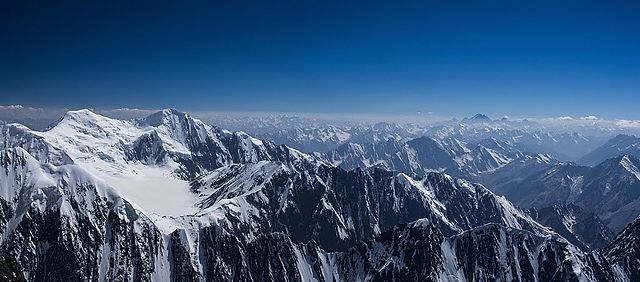The Kabul River, the classical Cophen, is a river that emerges in the Sanglakh Range of the Hindu Kush mountains in the northeastern part of Maidan Wardak Province, Afghanistan. It is separated from the watershed of the Helmand River by the Unai Pass. The Kabul River is a tributary of the Indus River, flowing into it near Attock, Pakistan. The Kabul is the main river in eastern Afghanistan and in the Khyber Pakhtunkhwa province of Pakistan.
Aerial photo of Kabul River flood-plain east of Kabul, Afghanistan
The Kabul River in the city of Kabul, 1966
The Kabul River in the city of Kabul, 1982
The Kabul River in the city of Kabul in 2009, now dried up
The Hindu Kush is an 800-kilometre-long (500 mi) mountain range on the Iranian Plateau in Central and South Asia to the west of the Himalayas. It stretches from central and eastern Afghanistan into northwestern Pakistan and far southeastern Tajikistan. The range forms the western section of the Hindu Kush Himalayan Region (HKH); to the north, near its northeastern end, the Hindu Kush buttresses the Pamir Mountains near the point where the borders of China, Pakistan and Afghanistan meet, after which it runs southwest through Pakistan and into Afghanistan near their border.
The Hindu Kush mountains at the Afghanistan-Pakistan border
Noshaq is the second highest independent peak of the Hindu Kush Range after Tirich Mir.
Landscape of Afghanistan with a T-62 tank in the foreground
Aerial view of Hindu Kush mountains in northern Afghanistan








